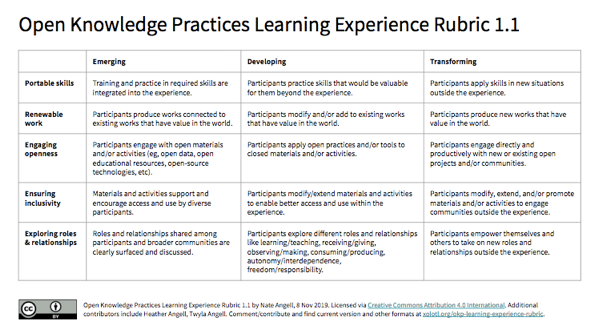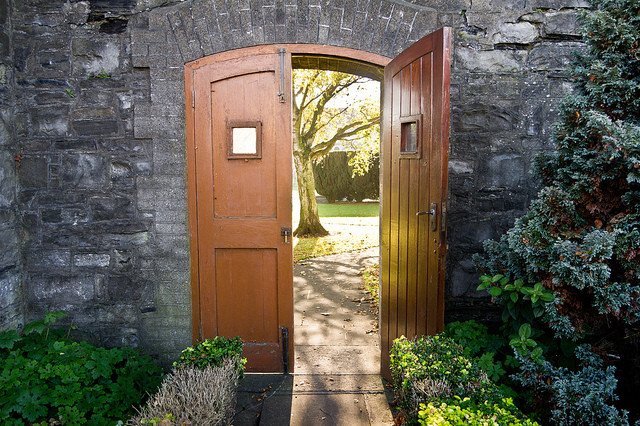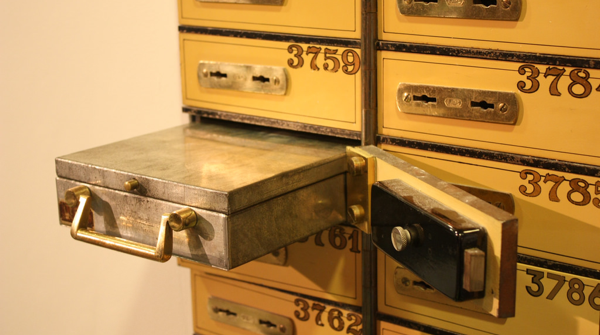As a part of the work I’ve been doing around opening knowledge practices generally, I’ve been thinking about how one might design open learning experiences that support multiple meanings of “open”: not just using open educational resources (OER), not just enabling open educational pedagogies (OEP), and not just offering wide access (like MOOCs), but all those meanings of open and more. To continue what is a long-standing conversation across the open community, I’ve tried to distill characteristics and levels of open into a rubric that one might use as a guide to designing and/or evaluating open learning experiences.
OKP
Open Knowledge Practices
Karen Cangialosi: On Empowering Students to Open Knowledge Practices
I just attended Achieving the Dream’s first Teaching and Learning Summit in Minneapolis, Minnesota, USA. The Summit had four tracks, each focused on a specific domain of teaching and learning:
- Open Educational Resources: Beyond Cost
- Guided Pathways: Ensuring Students Are Learning
- Culturally Responsive Practices: Leveraging Knowledge for Equity
- Adaptive Courseware for Early Success
I participated in the adaptive courseware track — guided by participants from Every Learner Everywhere — where I collaborated with the good folks at Houston Community College and other community colleges in Florida, Ohio, and Texas that are adopting adaptive learning platforms to improve student success.
The buzz at plenary sessions and mealtimes convinced me that participants in every track were as deeply engaged in the practical details of transforming teaching and learning as we were in the adaptive learning track. We had an incredibly productive couple of days together, making connections across disciplines and geographies to see how we might implement adaptive learning tools for various courses. These adaptive tools promise to enable students to take personalized learning pathways for knowledge and comprehension — speeding past what they already know and identifying where they might focus — while also enabling teachers to spend more time on higher-level, active learning, helping students apply, analyze and synthesize concepts.
Enter Karen
After all that wide-ranging, hands on work, the highlight of the gathering for me was when participants from all four tracks came together for a closing, plenary keynote from Karen Cangialosi on open pedagogy. Karen gave us all a truly remarkable experience.
Opening Nouns & Verbs
The open education community I run with is filled with the kind of people who think words really matter. For a while now we’ve been debating what to call the things we care about and do: open practices, open resources, open pedagogy, open licensing, open this, open that. Our debate is hot enough to make some people turn away and others dig in. But when words matter this much it signals real tensions in beliefs, priorities, territories and relationships.
Education for the Public Good
A chance encounter led me to want to post about my evolving views on education as essential public infrastructure. Thanks to a tweet by Sara Goldrick-Rab, I was led to an article by someone I’d never read, Corey DeAngelis, Policy Analyst at the Cato Institute: “Is Public Schooling a Public Good? An Analysis of Schooling Externalities”. If I were not already thinking about education as public infrastructure, I probably would have walked away from this article given all its issues (which I’ll end up addressing, like it or not) and the futility of engaging such polemical works. Yet so much sprang out of my reading of DeAngelis and the other works it led me to that I feel compelled to write, if only to set out some thinking on education as public infrastructure to build on later.
From 5R Permissions to 5R Practices
I’ve been working with open resources for some time and have recently wanted to make a profound shift in the way I think about open permissions, or “the 5Rs” (Retain, Reuse, Remix, Revise, Redistribute) as they are known. TL;DR: Let’s move away from thinking of the 5Rs as qualities of artifacts and instead think of them as tools we use in the activities of opening knowledge practices.
Opening Public Institutions
While every Open Education conference I’ve attended has been fantastic, #OpenEd17 was by far the best yet for me. It wasn’t just that there were great presentations (there were), and it wasn’t just that so many great people were there (they were, tho some were missing), nor was it the way we connected beyond the event (we did) via Virtually Connecting, the remote participation during the How can we destroy the open education movement? session, or what we hope is a way to keep the conversations going annotating together. What made #OpenEd17 so great was the way that the conference, some fortuitous conversations, and my own thinking came together so powerfully in a way they never have before.




